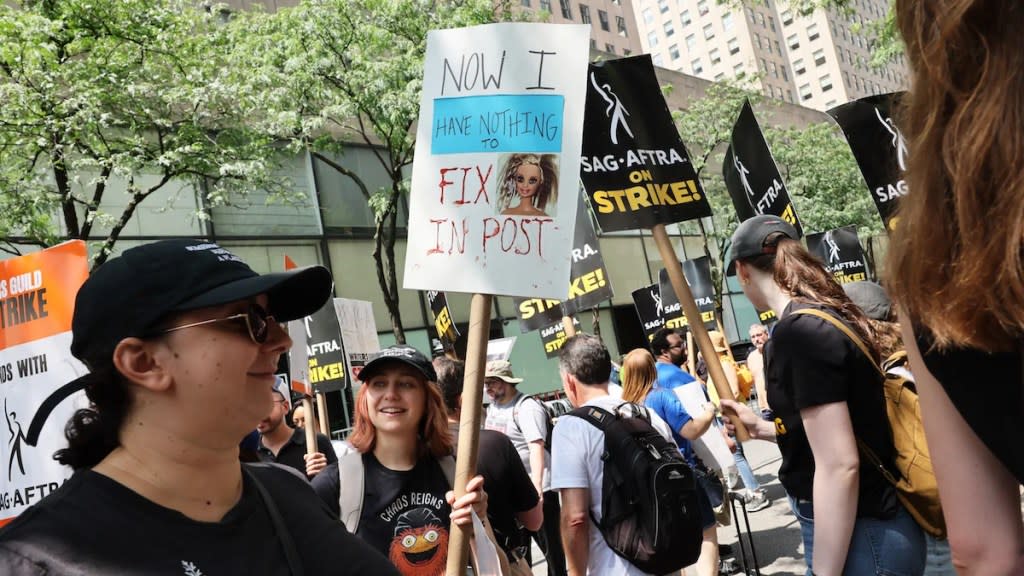The Actors’ Strike Presents Another Problem for Studios: Rerecording

As the SAG-AFTRA strike approaches the two-month mark, much ink has been spilled about how the actors’ union has put pressure on studios to give them a better deal by withholding major stars from promoting films hitting theaters this summer. But a less discussed topic has been the issue of automated dialogue replacement or ADR.
When shooting wraps on live-action productions the actors’ job isn’t done. They are often called during postproduction to rerecord their lines for any scenes where production audio is too noisy to hear the dialogue.
Over the past month, films like Sony’s “Kraven the Hunter” and Warner Bros./Legendary’s “Dune: Part Two” have moved their release dates, primarily with the hopes that the strike will be resolved by 2024, allowing the casts of those films to promote them. Others, like Disney/Marvel Studios’ “The Marvels,” have stayed put as the studio believes that familiarity with the MCU and its characters will attract audiences even without cast promotion.
But one insider at an independent distributor told TheWrap that if the strike continues past September, some films may have no choice but to move, not because of marketing concerns but because the actors are needed to do ADR work to complete sound mixes.
Studio insiders said that ADR-related decisions for release dates don’t have to be made now, but the likelihood of it becoming a bigger problem rises if the SAG-AFTRA strike lasts into October.
“ADR is a part of every film. You can’t get around it,” the insider said. “Every film was at a different stage of production when the strike began, but I think it’s safe to assume that a great deal of films set to come out during the winter that are in post right now need actors working again to finish the job.”
Some films, by their very nature, are more ADR-heavy than others. One example is Warner Bros.’ upcoming musical adaptation of “The Color Purple.” Any time there’s a big musical number in a film, like when Ryan Gosling sings “City of Stars” or “I’m Just Ken,” the singing comes from ADR tracks. ADR is as vital to musicals as CGI is for a superhero film.
One executive at a major studio told TheWrap that it was part of his company’s contingency plan as the strikes approached to take account of where every film was in development, including how much ADR was done in post. The executive said that if a studio is making a decision on whether a film would be ready for release, ADR is unlikely to be the make-or-break call on its own, even during an actors strike.
“Everyone has seen a film where it feels like the special effects weren’t quite done, and there are many projects where the postproduction work isn’t perfect the way the director wants it,” the exec said. “But there are times when the deadlines are coming [and] the producers just have to look at the whole film with the picture, and the effects, and the sound and decide whether it’s good enough or if something in there is so low-quality that it’s not ready for theaters.”
SAG-AFTRA has said that it remains open to resuming negotiations, but the Alliance of Motion Picture and Television Producers hasn’t reached out to the guild since the strike began on July 14, while talks with the Writers Guild of America have fallen apart after a contentious meeting on Aug. 22 between several top studio CEOs and the WGA negotiating committee.
Whenever talks between the studios and SAG-AFTRA resume, there will be plenty of difficult sticking points that will have to be resolved, foremost among them being SAG-AFTRA’s proposal for a new compensation structure for actors based on third-party streaming viewership data.
The guild said that better streaming compensation is needed for actors as cord-cutting has eroded the residual payments actors fall back on for financial support, but the studios outright rejected the guild’s proposed model during talks earlier this summer, saying that in such a model, “performers share in the rewards of a successful show, without bearing any of the risk.”
Another key sticking point is the issue of minimum rate increases, which SAG-AFTRA wants to increase by 11% in the first year of the contract, saying it is necessary for working class actors to keep up with rising living costs in Los Angeles and other major cities. The AMPTP has shown no signs of offering any rate increases beyond what was agreed upon with the Directors Guild, which consists of 5% in the first year, followed by 4% in the second year and 3.5% in the third year.
For all of TheWrap’s Hollywood strike coverage, click here.
The post The Actors’ Strike Presents Another Problem for Studios: Rerecording appeared first on TheWrap.

